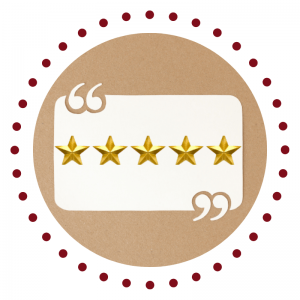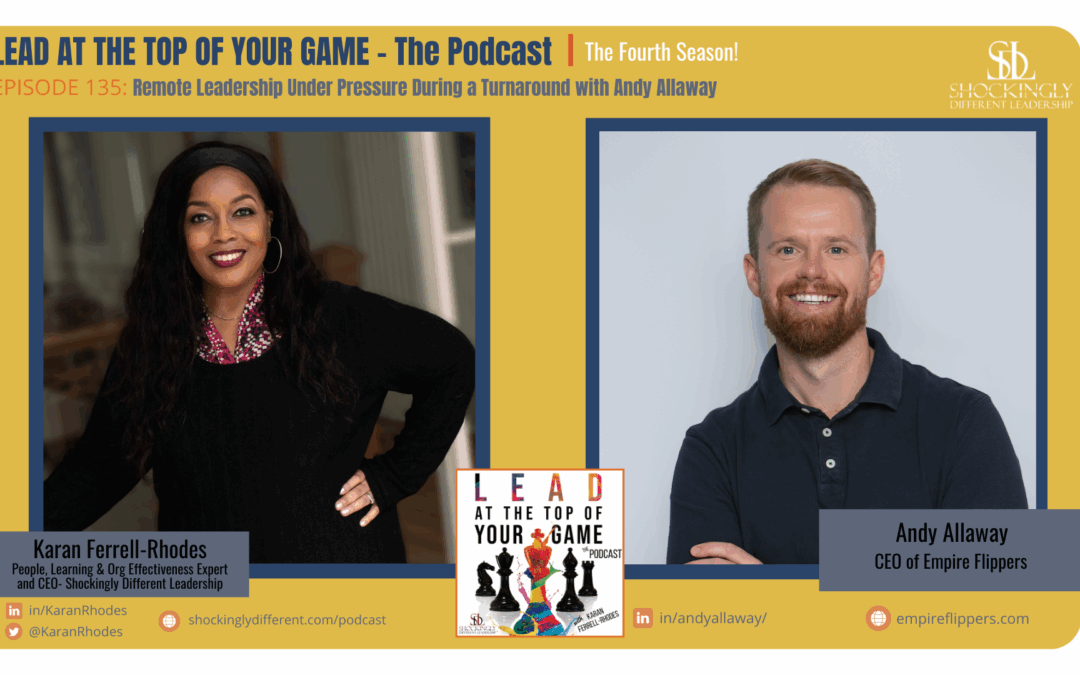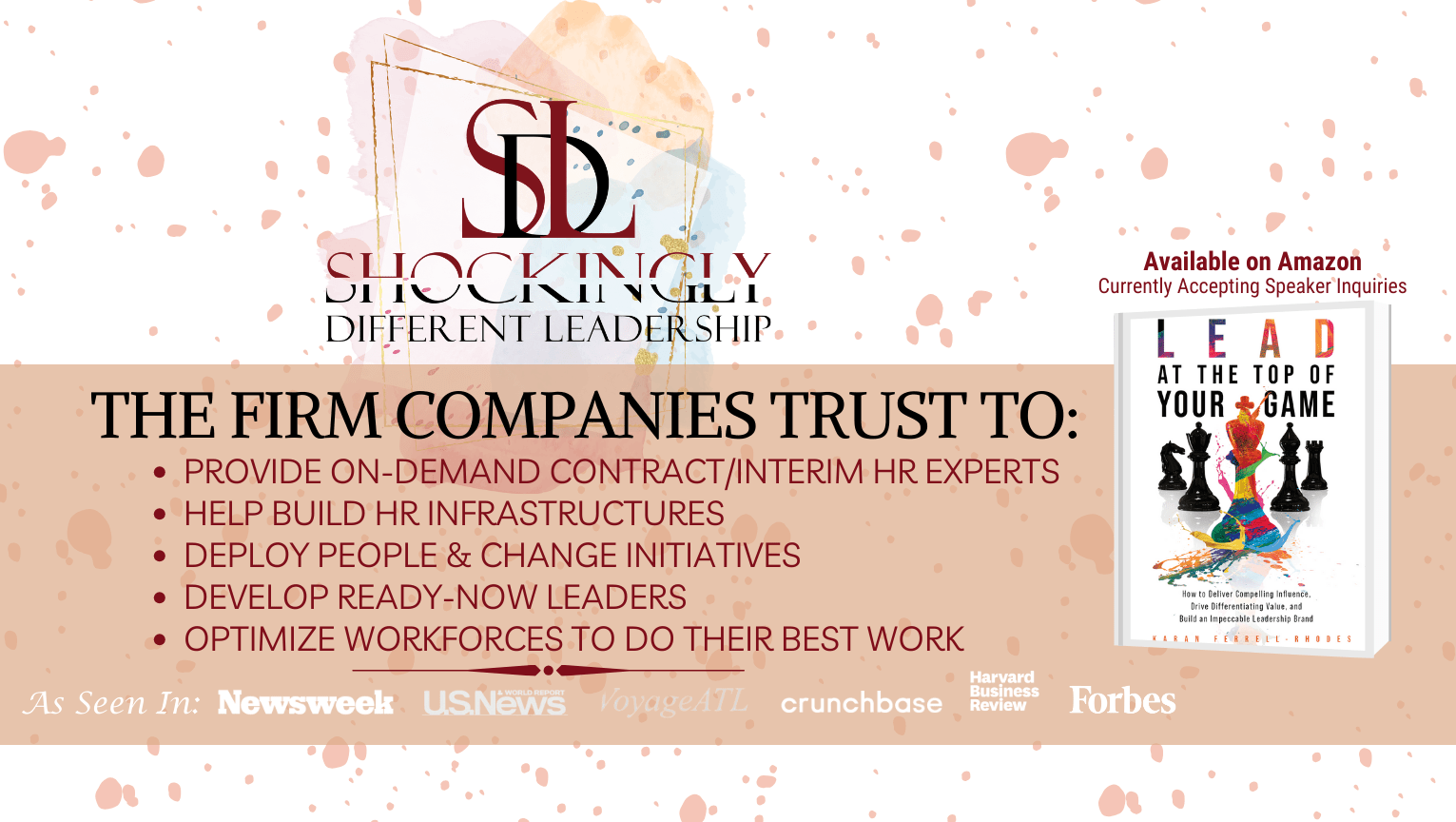IN THIS EPISODE, KARAN FERRELL-RHODES INTERVIEWS ANDY ALLAWAY
Andy delves into his professional journey, leadership philosophy, and the challenges he faced steering the company through industry changes. Andy shares insights from his early career in IT sales, his transition into online business, and his eventual rise to CEO, highlighting the importance of adaptability, team culture, and situational leadership. The conversation also explores Andy’s approach to leading during turbulent times, his passion for nurturing future leaders, and his perspective on the evolving landscape of online business.
Andy Allaway is the CEO of Empire Flippers, a top online business broker and marketplace that vets and lists businesses, rejecting over 90% due to its rigorous standards. They specialize in vetted e-commerce, SaaS, and agency businesses. They guide both buyers and sellers through the sales process, ensuring quality listings and smooth transactions, with fees paid only by sellers upon successful sales.

Posted by
SDL Media Team
Rather view our video podcast?

WHAT TO LISTEN FOR:
- Andy’s path from IT sales to CEO
- Leading a company turnaround
- What challenges do sellers face?
- Team culture and leadership in tough times
- How does Empire Flippers vet and support deals?
- Trends in online business and brokering
- Andy’s tips for new leaders
- Where to find Empire Flippers and Andy
“Success in anything in life starts with where you are trying to get to.”
FEATURED TIMESTAMPS:
[03:22] Andy shares his career path from IT sales to CEO of Empire Flippers.
[05:42] Discusses challenges and turnaround during industry decline.
[06:32] Explains Empire Flippers’ business model and vetting process.
[09:31] Outlines key steps for sellers preparing to sell their business.
[11:36] Describes support for buyers and the importance of good deals.
[13:36] Talks about scaling the team and addressing company culture.
[18:50] Shares his evolving leadership philosophy and situational leadership.
[22:58] Signature Segment: Andy’s entry into the LATTOYG Playbook: Learning leadership and seeking mentorship to develop your potential.
[24:46] Predicts future trends in online business and the impact of AI.
[27:55] Signature Segment: Andy’s LATTOYG Tactic of Choice: Drive for Results

ABOUT ANDY ALLAWAY
Andy Allaway is the CEO of Empire Flippers, the #1 place to buy and sell online businesses. With deep expertise in sales, operations, and leadership in remote settings, Andy builds lean, execution-driven remote companies that scale fast, deliver results, and give employees the freedom to live unconventional, high-impact lives.
Passionate about empowering remote leaders, Andy is also the creator and host of “The Leader Sip,” a YouTube channel that distills practical insights from the best business and leadership books, explicitly tailored for remote executives.
LINKS FOR ANDY:
- Website: www.empireflippers.com
- LinkedIn: https://www.linkedin.com/in/andyallaway/
ADDITIONAL RESOURCES FOR YOU:


Episode Sponsor
SDL is the go-to firm companies trust when needing to:
- supplement their in-house HR teams with contract or interim HR experts
- implement leadership development programs that demonstrate an immediate ROI and impact on the business

Episode 135 | Remote Leadership Under Pressure During a Turnaround with Andy Allaway
Andy Allaway 00:03
I think it all boils down to answering the what the number one question buyers ask, which is, what happens when I take the seller out of this business? Right? So for a business to be sellable and to demand a good valuation, kind of have to answer that question on a lot of different fronts.
Voiceover 00:03
Welcome to the “Lead at the Top of Your Game” podcast, where we equip you to more effectively lead your seat at any employer, business, or industry in which you choose to play. Each week, we help you sharpen your leadership acumen by cracking open the playbooks of dynamic leaders who are doing big things in their professional endeavors. And now, your host, leadership tactics, and organizational development expert, Karan Ferrell-Rhodes.
Karan Rhodes 00:36
Hello, my superstars. This is Karen, and welcome to another episode of the lead at the top of your game podcast. I am truly over the moon today to have a fantastic guest and an industry that a lot of us don’t know from us in the corporate side don’t know a ton about but we’re going to learn more about it today. We’re thrilled to have on today’s show Mr. Andy Allaway. And Andy is the CEO of Empire Flippers, and Empire Flippers is basically a business broker for online business, but they are the number one place to buy and sell online businesses. They’ve also been on the Inc 5000 fastest growing companies for numerous years. They’ve also gotten international awards, and the list goes on and on. But you know, Andy is really passionate about not only the business, but empowering remote leaders, and he’s also the creator and host of the leadership it’s a YouTube channel dedicated to distilling practical insights tailored specifically for remote executives. So welcome to the podcast. Andy,
Andy Allaway 01:45
Thank you. Pleasure to be here, looking forward to it.
Karan Rhodes 01:47
Same here, same here, as I mentioned pre show, I’m just dying to dive deeper and learn more about the business and you and some of your thoughts on your industry and in leadership. But before we do that, we always like to learn just a little bit more about our guests. So for just as much as you feel comfortable, would you give us a sneak peek into your life outside of work?
Andy Allaway 02:11
Yeah, of course. So I live in the south of the UK, about 40 miles west of London. With my wife, I got a four year old boy and a greyhound who is, who is struggling in the uncharacteristic heat we have here at the moment. And, yeah, I mean, you know what keeps me pretty busy, but and parenting and what have you, but the main thing I like to do outside of that is play golf. I’m a golfer. And, yeah, that’s about all I have time for in the week.
Karan Rhodes 02:36
It sounds like it, especially with a young family. But you know what you would be my husband’s best friend, because he is just addicted to golf, so
Andy Allaway 02:46
Just like that.
Karan Rhodes 02:47
Yeah, that’s what he says. I’m a great um, driver of the golf cart, but I won’t say I’m I just hold the spot when we go golfing. He likes to go with his friends that are very competitive. So awesome. Well, thank you so much for sharing that. All right. Well, let’s delve into our conversation. Andy, if you don’t mind. And first of all, I would love for you to just give a few highlights of milestones of your professional career, and then what led you to becoming the CEO of Empire Flippers?
Andy Allaway 03:22
Yeah, sure. So I’ll kind of give the Cliff Notes on my career. You know, my I’ve always been drawn to kind of management roles. In the early part of my career, I worked in IT sales and I was a fairly average sales person, but I moved pretty quickly into sales management, and I was a pretty good sales manager, and I was kind of progressing up that, you know, big corporate career track until maybe I hit about 30, and then I just was kind of bored with corporate life, to be honest. So I went traveling for a year, and then I got into kind of building out small websites and monetizing them. Long story short, that’s eventually how I came across Empire Flippers. And they were very, very early days. We have two US founders who had, kind of, like, moved out to Southeast Asia, and we’re building the business from there. And at the time, I joined as kind of one of our first hires. And at the time, the part of the role was you had to move out and live in Vietnam for the first year. And that’s kind of really what sold it for me. I had kind of traveled around Vietnam, loved the country. Didn’t really want to be in the UK at that point. And so that was start of 2017. Joined in the early days, and then we went through a pretty quickly, kind of like as we hired more people, became part of the management team, and I ran operations for kind of the longest into the company, which we basically, we have a team that vets businesses before they go on the marketplace and migrates them after we sell them. That was kind of my area. So formed part of the management team as we were growing. And then, you know, around about 2023 the industry and our business. In that industry hit a bit of a sticky patch where we weren’t growing anymore. In fact, we kind of the business declined that year, and that’s the point where I think our founders realized it was time for somebody else to kind of step up and take the reins. And so I’ve been running the company and really leading a bit of a turnaround over the kind of two years since then,
Karan Rhodes 05:20
Amazing. Well, you’re still standing and to tell the story, so I’ll say congratulations on continuing to weather the storm. But I believe, like all industries, you’re just having CEOs and their teams are having to rethink how to remain viable for the long term. How things are you know, evolving and changing, and you’re a big testament. You and your team are big testament to that.
Andy Allaway 05:41
Yeah. I mean, it’s, yeah, there’s a lot that kind of goes into how we got to the point we were in 2023 some outside of the company, some inside of the company. But I can safely say that this moment right now is the most I’m sleeping at any point in that two year period. So things are good at the moment.
Karan Rhodes 06:00
Excellent. Excellent. Gotta get that sleep in. Well, I know I didn’t do empire builders justice. So would you mind sharing with the audience a little bit more about what it is to be, say, a business broker of online businesses. What do you all do? And you know, how do you bring value to your clients? And it’s a two sided deal. So if you can just share a little bit more like one level down to help our listeners understand what you do.
Andy Allaway 06:32
Yeah, of course. So Empire Flippers, we’re kind of like a marketplace broker combination. So we have a marketplace where at any time, we’ll have maybe 150 160 businesses listed, some something like that, and where we really excel First off is that we’re a vetted marketplace. So there are other marketplaces where, you know, anybody can go and list a business and maybe the numbers are fake, or maybe there’s some other stuff that they’re covering up. You know, we have a substantial vetting team, and we reject in excess of 90% of the businesses that get submitted to us, so we only list businesses that like pass our vetting and that we’re kind of confident we can sell. So that obviously makes it a much safer environment for buyers to come and kind of do their due diligence, and they still have to do due diligence, but they don’t have to be questioning, like, every number on the listing, like, we’ve checked a lot of that stuff, and then also, so that’s kind of like, where we’re a fit for buyers, and then on the seller side. You know, a lot of like you said, this is still an industry that most people are not even that familiar with, right? And so a lot of people are running a successful business. And, you know, the majority of what we sell is kind of, e commerce, SAS, agencies, those type of businesses, but for the most part, you know, sellers have been really deep in building their business, but don’t really know a whole lot about how to sell one, right? And so we have a team that will, you know, kind of handhold them through calls with buyers and drawing up agreements and all of this kind of stuff. You know, we, like I said, we migrate the businesses after we sell them, so we kind of have a technical team that helps with all of that stuff. And, yeah, that’s kind of why it makes sense for sellers to kind of sell their business through us and then pay us a fee as a result as well.
Karan Rhodes 08:20
Interesting, interesting. And it’s the sellers who pay you the fee, or is it split between the seller and buyers?
Andy Allaway 08:27
It’s the sellers. So when we list the business, we’ll kind of agree a list price with the seller, and then we agree, you know, effectively a commission, like a real estate broker or, you know, similar kind of model to that. And, you know, we don’t have any retainers or anything like that. So, you know, if we don’t sell your business, we don’t get paid anything. And that’s why, another reason why we’re, you know, super conscious about only listing things that we think we can do a good deal for sellers on.
Karan Rhodes 08:53
Yeah, that makes a lot of sense. I know when I was, you know, researching the company and, you know, looking at some of the listings that were on there, there’s quite a variety, but quite a few that are, you know, on Amazon, which you know, especially I’ll just mention in the US. I mean, people live on the Amazon site. And I’m curious what you all see are some of the greatest needs or obstacles when sellers want to sell, of what they have to do to get their businesses ready to sell?
Andy Allaway 09:31
Yeah, that’s a really important question, and we will often be working with sellers, you know, 123, years out from when they’re actually ready to sell. You know, we’re very happy to kind of do these Exit Planning calls. I think it all boils down to answering the what the number one question buyers ask, which is, what happens when I take the seller out of this business? Right? So for a business to be sellable and to demand a good valuation, kind of have to answer that question on a lot of different fronts. So, you know that that will be things like having a team in place, or processes in place so that the business doesn’t depend on the seller doing like, 40 hours of the actual, you know, operations of the business every week, having well documented processes that a buyer can kind of pick up, and things like that. And then, yeah, you know, thinking ahead of time about getting financials in a good state. Again, this is all stuff that we kind of help with through our vetting process, but yeah, all kind of variations of answering that question, basically.
Karan Rhodes 10:32
Gotcha. And I’m just curious. So online businesses frequently have large staffs, or do you find them usually smaller staffs, or somewhere in between?
Andy Allaway 10:44
Yeah, that’s a good question, and it definitely depends on the size of the business a little bit. So, you know, we sell everything from kind of 50 to 100k list price businesses up to like, mid seven eight figure businesses on our marketplace. And obviously, the bigger they get, the more likely it is. They have substantial teams. But for like, the midpoint of that, say, like six, seven figure businesses, you know, it’ll normally be the seller and, you know, maybe some, some contractors, or one or two staff members, they’re not normally huge teams, no.
Karan Rhodes 11:15
Yeah, that makes a lot of sense, a lot of sense. And, um, on the seller side, I’m sorry, on the buyer side, are there things that you all do to help prep them for buying or are they pretty buyer savvy, and you spend most of your time with the sellers?
Andy Allaway 11:36
No. I mean, we definitely spend time with both. For sure, buyer savviness is a spectrum. And, you know, we have a lot of very experienced buyers who are, you know, running more kind of institutional money type companies and will be buying assets as part of that. But we also have, you know, a really good base of buyers who are, you know, maybe just high net worth individuals, they have a good, paying, full time job, and maybe they’re looking for a side hustle, or maybe they’re looking to kind of replace that income. And yeah, we have a lot of resources geared towards helping buyers do due diligence and things like that, because, you know, we we want as many deals as possible to go really well for sellers and for buyers. So we do, you know, we have a fiduciary responsibility to get good deals for sellers, but we kind of view ourselves as having a responsibility to increase the chances of just doing good business full stop as much as possible.
Karan Rhodes 12:35
Awesome. Well, one of the things we do like to share on the our episodes Andy is, you know, the good, bad and the ugly, you know, of it. And being that, you know, CEO, you mentioned, there were some, you know, tough times you had to help navigate your team through, and basically, you know, navigate a turnaround, like you mentioned before, I was wondering if you would mind doing, you know, one click down on that, on you know, what’s the story that you can share? Not any you know, release any IP or anything. But you know, how was that? How do you turn around and establish company, you know, and galvanize the team and make very tough decisions, like, you know, if you’re needing to trim the staff or, you know, rethink the industry. Would love to hear a little bit more about that story so that folks can understand that. You know, even CEOs have struggled to you know when the when the industry turns, or times turn.
Andy Allaway 13:36
Totally, yeah, I think you know, if you got so if you go back slightly to when times were very, very good for us, was like during covid, you know, while it was kind of tough for a lot of industries, everything was going online. So all of a sudden, all the businesses that we sell are performing amazing. You also had some kind of stuff specific to our industry. So you mentioned we sell a lot of Amazon e commerce businesses, which we do, you know, there were these roll up companies that raised billions and billions to buy literally hundreds of those companies. And we had a lot of them. So like, you know, 2020, 2021, were kind of insane years for us. And as part of that, you know, we scaled up our team incredibly quickly. You know, I will mess the exact numbers up, but let’s say, you know, at the start of 2020, maybe we were like 3040, people, something like that. And at the start of 2022, we were more like 90. So we’d hired a lot of people. And you know, that changes the culture in a way, that when you’re performing as well as we were, you kind of, like, miss the little signs that maybe there’s some cultural breakdown in certain areas. And then, yeah, you know, I think in 2023 a lot of it was kind of market driven, you know, you had the inflation and interest rates and all of this stuff that, like, was very, very good for us. Previously, it was kind of a little more uncertain. And, but then it really highlighted, you know, once the performance dropped slightly, it highlighted that we had these kind of cultural cracks. And so, you know, that that’s really kind of the first thing that I did when I, when I took over in mid 2023 was I, I bet on the people who were still, like, culturally, on board with the company, you know. And there were some people who, and there were some leadership mistakes through that period as well, you know, leading up to that. So there were some people who felt rightly aggrieved about certain things. But I felt in terms of, like, you know, what I have to do at that moment and give us the best possible chance of coming out the other side. Was to who are the people that are like, still on, still on the team, and can be, kind of got back on board. So I had that front of mind when I and we did kind of do some, some reduction in our team through that period. The one thing I did off the bat was I, I stacked my leadership team full of people who I knew would run through walls for me, you know. And I kind of, I like to say, I picked my ride or dies over the people who were like, resume, the best fit for the roles, and that because I knew that things were going to get worse, likely before they got better. And they did so. So I think that’s something I got really right. And then, you know, we just tried to, we just tried to simplify it like we haven’t done anything that’s completely off the wall, you know, we just, what are the core things we need to do? Well, we need to make sure we’re calling buyers and stuff like this, you know, like absolute basics, make sure we’re tracking them. And then I just tried to, you know, we got to a point with our planning meetings where each department would have 10s and 10s of goals and all this different minutia. And I tried to get back to, you know, 80% of what we need to do is nail the day job really well. What’s the 20% we’re going to work on? This quarter that, like, moves us to that next level. We’ve just been rinsing and repeating that for two years.
Karan Rhodes 16:52
Wow. It seems to have worked well. And I’m sure that you know, when you’re in the minutia of it, because the devil’s in the details, right? It’s important, but that that seems like a great formula to stay viable and to keep improving. I always have an eye on continuous improvement. Definitely.
Andy Allaway 17:15
Yeah, exactly. Well, we’ve just closed out q2 obviously, and it was our best quarter in several years, most deals sold, most offers accepted. You know, we kind of comfortably hit target and so, yeah, it’s so far so good.
Karan Rhodes 17:29
That’s fantastic. Congratulations on that. How hard is it to navigate the business laws in different countries of where these businesses are founded, is that easy or a tough thing for you all to do?
Andy Allaway 17:49
So in our area, it tends to be reasonably straightforward, because the vast majority of deals that we do, definitely 90% plus are asset sales rather than company sales. So it’s normally one company acquiring the assets of the business, the website, the different accounts and things like that, and so yeah, you know both, both sides typically will have lawyers involved in purchase agreements and stuff like that. But it being an asset sale does tend to simplify things a decent amount.
Karan Rhodes 18:21
Interesting, very interesting. Well, let me to switch and turn to some of the things that you’re doing and your you know, your thoughts on leadership, and some of the latest passions that you have in this space. I had mentioned earlier that you have your own, think, a YouTube show now, and would love to learn you know more about your passion about leadership and who you’re, you know, striving to help support and give insights to.
Andy Allaway 18:50
Yeah, I think so. You know, I am very passionate about online business. I talk about it a lot, but I am more passionate about leadership and kind of running teams like that, you know, that’s kind of the common threads, even pre Empire Flippers through everything that I’ve done, yeah, you know, I like, for me, like leadership, and particularly now running a company is it’s like, you know, you place Little Bets, and you try to do things with leverage, and then you kind of see how they pan out. And that kind of, you know, like little psychological experiments is kind of exciting. And I think, you know, I would say, over the last few years, my leadership style, or, like, the way I think about leadership, has kind of evolved because, you know, the kind of default that you read everywhere is things like, you know, hire good people and get out of their way. And it’s this, like, it’s this giving of ownership is always the best way to lead, and that is my natural way to lead. I think if you would have asked me, you know, three years ago, I would have, like, parroted that, I would have said the same thing. But I actually think leadership is much more situational, specific these days, you know. And I. Seen that through, like, turn, you know, the turnaround that we’ve been through that there, what? There was a time where Ben Horowitz has this great kind of wartime CEO versus peacetime CEO piece, right? And I had a period where I had to be the wartime CEO, right? Which is, hey, this is the way we’re doing things. You create absolute clarity. People feel that you’re not giving them enough kind of ownership and responsibility. But it’s, like, it’s more important that things get done the way that kind of, I need them to be done right now, and that, like, that’s naturally a little less comfortable for me. Like, I don’t, you know, it’s not how I like managing, but yeah, that. So that’s kind of the the evolution I’ve been through with it. So that was a, kind of a long winded answer to your question, don’t have I quite now?
Karan Rhodes 20:41
Yeah, it’s a great question, because what we found, you know, I’ve been passionate about leadership my whole career, obviously, and and do a lot of human capital advisory for companies now. And what we do is we do help like the C suite, understand there are times you have to or it’s a good idea to change your leadership style for the sake of the now, but you will naturally go back to you what’s comfortable for you when times are good and and that’s an effective leader, and that’s okay. You know, it may not feel good, but that might be what it’s it’ll take for you to overcome the next obstacle. But What’s critical is to help people understand that now’s a time of intense focus. You know, I’m going to be focused on this. I might be micromanaging for a second or two, but it’s necessary for the business, and I’m trying to keep us in survival. Save your job. You know, you go on in your own words, but it’s okay to do. And I love that you shared that that is not your most comfortable style, but it’s, it was something that you, you know, had to do for the time and kind of get through it,
Andy Allaway 22:04
Yeah, I think the kind of the thing that, the thing that I told myself, you know, back then, was, you know, it’s okay if I fail, because, like, I was just wrong, right? Like, I placed the wrong bets, I went after the wrong strategy. It’s, like, totally unacceptable if I’m wrong, because, like, that strategy didn’t get carried out properly, right? Like I didn’t manage the implementation of it well enough,
Karan Rhodes 22:24
Right. You’re absolutely right. I’m curious where, what advice would you give to more early in career professionals or or young leaders as they are, I won’t say climb the corporate ladder, per se, but as they’re really trying to grow their careers, what things do you advise them to keep in mind, if you had, like, one or two things that you wanted to leave with the world of advice, what would those be?
Andy Allaway 22:58
Yeah, I think the the first thing that comes to mind is the like, anything else, leadership is a skill, right? And some people may be kind of, you know, a little more naturally gifted in it, but like, everybody can learn leadership. And there’s, like, more resource, more resources out there talking about leadership than you could kind of need in a lifetime. So I think again, is having a growth mindset to the fact that, you know, sometimes people will say, Well, I’m not a leader, or I’m not a people person, but, like everybody can take steps in that direction, and then I think, yeah, the way to lead, I think, is to identify, kind of, like the other people in the business who are going to be Leaders. You know, one of the things that gives me the kind of the most pride in kind of my time Empire Flippers, is spotting the people who maybe do have the capacity to be leaders and want to and like helping to nurture that. And so I guess to answer your question about someone who’s early on is like, you know, find, find somebody maybe a bit further on in that journey, and kind of show them that you’re the person that could be the next version of them, or the next leader in the business. And you’ll likely find them wanting to kind of help you advance on that front, you know,
Karan Rhodes 24:11
Absolutely no That sounds right. I love to switch back to Empire Flippers for just a second, because it is a very unique industry for, say, a lot of our listeners, because a lot of our listeners are corporate, individuals and leaders, I’m curious where you see this industry going in the next I’d say, one to two years. How do you think the future of online businesses are going to be. What trends are you kind of spotting out there right now?
Andy Allaway 24:47
Hmmm. Yeah, so I think, you know, the it’s, it’s not telling any secrets that the world will just continue getting more on more online. I think you know every, every kind of stat is kind of telling you that AI probably puts that on. Steroids a little bit. And, you know, typically in our business of selling these assets, we’re typically, like a year or two behind whatever is kind of big at the time. And you know, so, for example, there was a very, very big trend of building businesses on Amazon and third party sellers and stuff like that. And then that always kind of filters through to kind of us a bit later, you know, in terms of, like, where we’re placing our bets, like, still very much on E commerce. You know, I think e commerce just continues to evolve and grow, both on Amazon but also off. You know, my I would bet that in two years, there will be more Shopify stores than there are today and these kind of things. So, yeah, I don’t think that changes. And if anything, you know, what’s kind of exciting in our space is, I think some of the you asked about, kind of like, typical team size, uh, earlier. I think some of the AI and the automation stuff, which is, you know, every week there’s something crazier at the moment, if anything, it, yeah, it just means that one person’s ability to run a very sizable business with, like, minimal team, or maybe even no team, just, I think, is going to increase. So, yeah, I think it’s still, you know, a very exciting time in what we do.
Karan Rhodes 26:12
I think it is too, and I I can see your industry in the work that you all do, is Business Brokers really expanding. Greatly easily based on trends that we’re seeing anyway, but we’ll keep our fingers crossed. Are you all as well? Well, you know, Amy, you know, out of our conversation, it’s so easy to understand why you had selected the answer you did for our signature question, for our guests and for my new listeners out there. You may not know, but our firm did a lot of research on high performing leaders and companies, and what it took that, what it was it that they did differently in executing versus 99% of the the population, and out of the research, there were seven big buckets of activities. We call them tactics, but buckets of activities that they use to help be successful. And Andy was so kind of shared that I’m having a drive for results. Was one of the one out of the seven that really popped for him. And just so you all know, all know, all seven are equally as important. You use them at different times, but usually there’s one that kind of really resonates with you. And for Andy, it was drive for results. And the way we define it is having a drive for results is being, you know, very tenacious about making sure your end goals are ultimately achieved, even if you have to pivot or make changes along the way. But it’s just, you know, taking those baby steps, staying for making progress, and still getting to the, you know, in gold. So curious minds really want to know. Andy, why does having a strong drive for result really resonate with you?
Andy Allaway 27:55
Yeah, yeah. I think you kind of set it up nicely, which is, I think success in anything in life starts with Where are you trying to get to, right? And even in business, that could be a million different things. You know, some people are trying to grow unicorns. Some people are trying to build good lifestyle. Businesses give their team kind of flexible life, stuff like that. So I think you start with the end goal, and then again, you place the bets that you think kind of get you to that place, and then you just, I go back to, you know, if the bets are wrong, then you can pivot and you can change them, but if the bets are right, and then you don’t execute against them, like it’s just criminal, and you never get the right information to adjust. And so that’s kind of how I think about our business. Is like long term vision, and then we, you know, we do the kind of the 12 week year planning, you know, we don’t. I’m not a big fan of annual goals, because I think, you know, you it’s February, and you’re not on pace, but you think you’ll catch up later in the year, and that just kind of carries on the whole way through. So we try to get hyper, hyper focused on the 12 week goals, and then at the end of it, did we do them? Did we not do them? Did they do what we think we were going to do? If not, let’s adjust and like, that’s how my simple brain thinks about business.
Karan Rhodes 29:08
Well, I love it. Sometimes the simpler, the better. What is it? Keep it simple, stupid phrases, but yeah, so keeping it simple is better, and it’s easier for understanding and communicating to the team too, about what they should prioritize to help the business, you know, stay and remain strong. So that is awesome. Well, Andy, you know, we’re going to have a course your detailed bio, links to where to find in power flippers and other information in our show notes. But I always love to give time to our guests on the air to share where folks can find you all. So if they’re curious about where to find you or get more information about Empire Flippers, where can folks look?
Andy Allaway 29:52
Cool. Yeah, so absolutely, Empireflippers.com is the best place for stuff about the company. I’m pretty active personally on LinkedIn, so that. Tends to be a good place to get me. And, you know, I talk about some Empire Flippers stuff. I talk about some kind of stuff more to do with my leadership show and pop car on YouTube. So, yeah, LinkedIn, just Andy Allaway on LinkedIn is a good
Karan Rhodes 30:12
place, all right. Well, if you didn’t catch all those real quick, everybody, if you were driving, no worries. Just hit the show notes link, and you can find the actual live links there as well, but definitely check out Andy and his team. I personally did quite a bit of research on them, and it was just absolutely fascinating. So that’s why I really was so excited to have him on the show today. So thank you so much, Andy for the gift of your time and sharing your insights with our listeners today. Pleasure enjoyed it. Thank you, awesome, and thank you to listeners for the gift of your time as well. Because, as I always say, I know there are literally millions of other podcasts you can be listening to, and we do not take your patronage slightly at all. All that we ask is you like and subscribe on your favorite podcast platform of choice and share our podcast with just one friend, because by doing so, help us all to better lead at the top of our games. Thanks so much. And see you next week. And that’s our show for today. Thank you for listening to the lead at the top of your game podcast, where we help you lead your seat at any employer, business, or industry in which you choose to play. You can check out the show notes, additional episodes, and bonus resources, and also submit guest recommendations on our website at leadyourgamepodcast.com. You can follow me on Twitter, Facebook, Instagram, and LinkedIn by searching for the name Karan Rhodes with Karan being spelled K a r a n. And if you like the show, the greatest gift you can give would be to subscribe and leave a rating on your podcast platform of choice. This podcast has been a production of Shockingly Different Leadership, a global consultancy which helps organizations execute their people, talent development, and organizational effectiveness initiatives on an on-demand, project, or contract basis. Huge thanks to our production and editing team for a job well done. Goodbye for now.

Want to be a Podcast Guest?
Check out our guest qualifications and submit our brief form to be considered.

Want Karan to be Your Podcast Guest?
- Blended Workforces & the Gig Economy
- Critical Execution Tactics of High-performing Leaders
- Entrepreneurism & Leading Your Business

Want to be a Podcast Sponsor?
All sponsorships come with a featured spot on show notes pages.

Like the Show? Please Leave a Review
If you like the show, it would mean the world to her if you left a quick review.
Your word is golden, so a HUGE thank you in advance!

#KeepInTouch
via our podcast alerts
Subscribe now to discover why thousands of monthly listeners who are passionate about doing their best work prioritize time each week to listen to the Blended Workforces @Work podcast.
#AboutSDL
#WhereToFindUs
MAILING
4480-H South Cobb Drive
PMB 219
Smyrna, GA 30080
PHYSICAL
2121 NewMarket Parkway
Ste. 108
Marietta, GA 30067
#ContactOptions
Customer Service Email:
service@shockinglydifferent.com
Call or Text:
770-384-1103
#Office Hours
MON-FRI
8:30 AM – 6:30 PM
Weekends By Appointment






